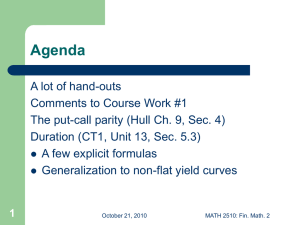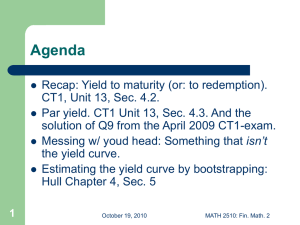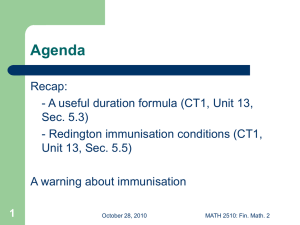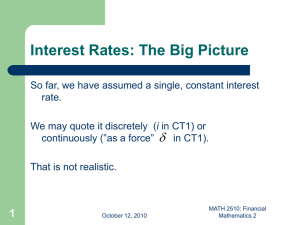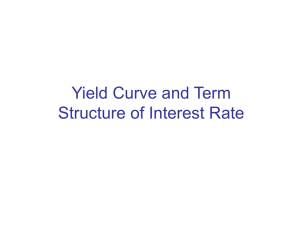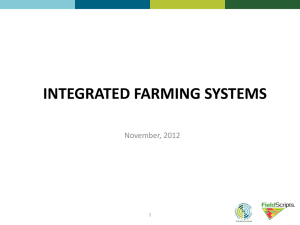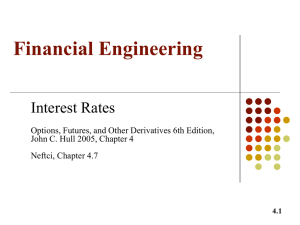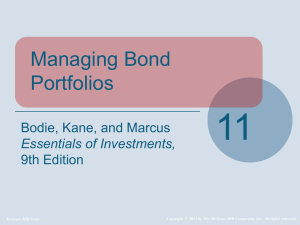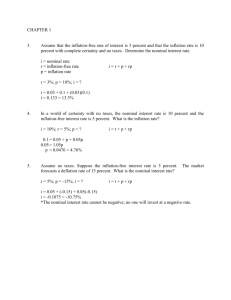Slides_20101014
advertisement
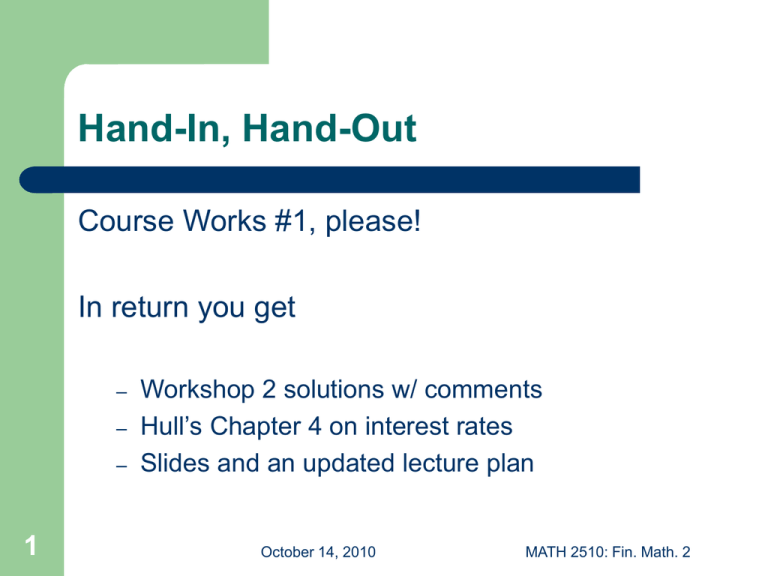
Hand-In, Hand-Out Course Works #1, please! In return you get – – – 1 Workshop 2 solutions w/ comments Hull’s Chapter 4 on interest rates Slides and an updated lecture plan October 14, 2010 MATH 2510: Fin. Math. 2 Agenda 2 Recap: Zero coupon bonds, spot and forward rates, the yield curve. CT1, Unit 13, Sec. 14.1. In fact also recap: Yield to maturity (or: to redemption). CT1, Unit 13, Sec. 4.2. Par yield. CT1 Unit 13, Sec. 4.3. And the solution of Q9 from the April 2009 CT1-exam. A teaser: Something that isn’t the yield curve. October 14, 2010 MATH 2510: Fin. Math. 2 Yield to Maturity (or: to Redemption) Consider a bond with cash-flows ct at times t = 1, 2, …, T, and price P. Its yield to maturity, i, is the solution to the equation: T ct P . t t 1 (1 i ) This is a non-linear equation; must be solved numerically. 3 October 14, 2010 MATH 2510: Fin. Math. 2 The yield to maturity can be interpreted as measure of the average return of the bond over its life-time. But be careful about taking the intepretation too far quantitatively. (”You don’t buy groceries based solely on price per kilo”.) Do value calcuations and comparions w/ the zero coupon yield curve. 4 October 14, 2010 MATH 2510: Fin. Math. 2 The yield to maturity is a weigthed average of forward rates, where more weight is given bigger ct’s. (Imagine making forward rate agreements to reinvest ct between t and T.) But again: Not a quantitatively simple average. 5 October 14, 2010 MATH 2510: Fin. Math. 2 An Often Seen Case For a (bullet) bond w/ n coupons c and full redemption of notional (say 1) we have P c ai v n n where as usual v=1/(1+i) and 6 October 14, 2010 ai (1 v n ) / i n MATH 2510: Fin. Math. 2 Cont. Comp. Yield to Maturity The continuously compounded yield to maturity, Y, for a bond paying at dates tj is the solution to P n ct j e t j Y j 1 If payment dates are not completely regular, I’d use continuous compunding. 7 October 14, 2010 MATH 2510: Fin. Math. 2 Par Yield The par yield , ycn, is the bullet bond coupon rate that makes a n-term bullet bond trade at par, i.e. have a price of £1 per £1 notional. Or in symbols: 1 Pn ( yc n ) j 1 Pj n ( yc n ) 1 Pn n j 1 . Pj With a non-flat yield curve, par yield and yield to maturity is not the same. (Artimetic vs. geometric effect.) 8 October 14, 2010 MATH 2510: Fin. Math. 2 April 2009 CT1-Exam Q9 [see hand-out] 9 October 14, 2010 MATH 2510: Fin. Math. 2 Teaser: A Graph I Got From Bloomberg Mid-Oct. 2010 yields to maturity of UK government bonds (y-axis) for different maturities (x-axis). 10 October 14, 2010 MATH 2510: Fin. Math. 2 Questions (0. How do you like the scaling?) 1. Why is that not the (zero coupon spot) yield curve? 2. What do we do about that? How do we estimate the yield curve? 11 October 14, 2010 MATH 2510: Fin. Math. 2
